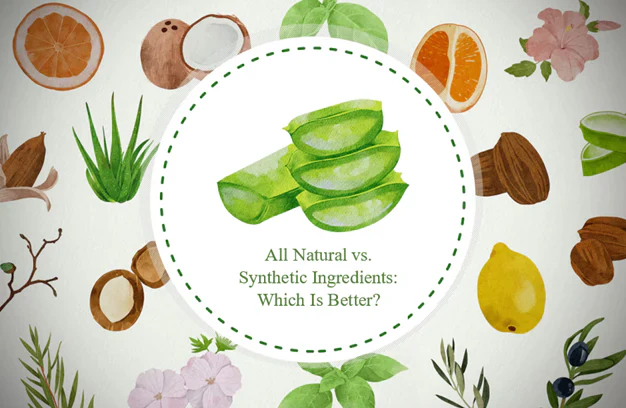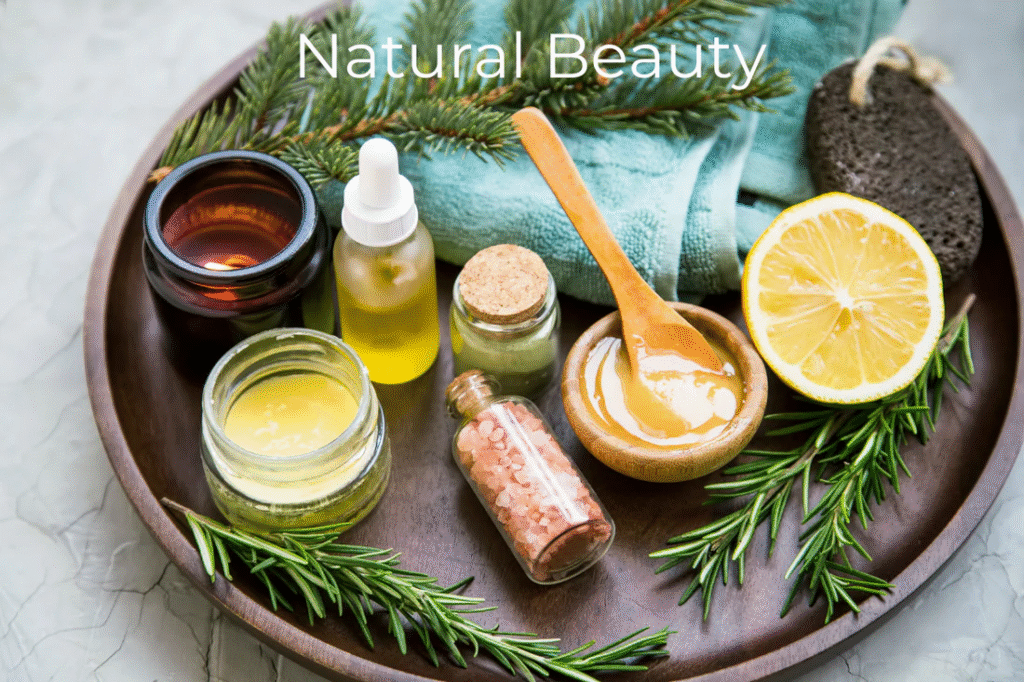
Natural skincare uses minimally processed plant, mineral, or animal ingredients, valued for their nutrient-rich and eco-friendly nature, while synthetic skincare relies on lab-made compounds offering precision, stability, and consistent results. Both can be effective depending on formulation, skin type, and purpose.
Key Takeaways
- Natural skincare derives ingredients from plants, minerals, or animals with minimal processing.
- Synthetic skincare uses lab-created ingredients for targeted, stable, and long-lasting results.
- Natural products are eco-friendly but less stable and may trigger allergies.
- Synthetic formulations ensure potency, longer shelf life, and proven safety testing.
- Choice depends on skin sensitivity, goals, environmental preference, and budget.
- Modern skincare often blends both types to balance safety, performance, and sustainability.
What Is Natural Skincare?
Natural skincare refers to products made primarily from ingredients sourced directly from plants, minerals, or animals with minimal processing. These ingredients are often recognized for being gentle and close to their original form. Common natural ingredients include:
- Plant oils like jojoba, almond, and coconut
- Botanical extracts such as aloe vera, chamomile, and green tea
- Essential oils like lavender and tea tree
- Mineral ingredients like clay or mica
Face masks made with botanical extracts or synthetic actives can provide additional benefits for hydration, soothing, or repair (Facial Masks for Glowing Skin).
Understanding Synthetic Skincare
Synthetic skincare products are formulated with ingredients created through chemical processes in labs. These ingredients are often designed to mimic, enhance, or supplement natural compounds but offer advantages like consistency, stability, and targeted performance.
- Preservatives to prolong shelf life
- Silicone-based compounds for smooth texture
- Synthetic vitamins and antioxidants
- Chemical sunscreens
- Fragrance compounds
Key Differences Between Natural and Synthetic Skincare
Understanding the differences between natural and synthetic skincare products is vital for choosing what best suits your skin type, needs, and lifestyle. Below are the key distinctions explained clearly and comprehensively.
Ingredient Source: Natural skincare uses ingredients derived mostly from plants, minerals, or animals with minimal processing. Examples are plant oils, botanical extracts, essential oils, and mineral clays. Synthetic skincare is formulated with lab-created or chemically modified ingredients designed for consistency, stability, and specific skin-targeting benefits.
Safety and Allergies: Natural products often appeal to those seeking chemical-free options, but some may cause allergic reactions, especially due to essential oils or plant extracts. Synthetic products undergo rigorous safety testing, although they can sometimes irritate sensitive skin due to preservatives or other chemicals.
Efficacy and Consistency: Synthetic skincare delivers consistent and potent effects with precisely measured active ingredients. Natural ingredients can vary in strength depending on their source and processing, often offering milder, more holistic benefits.
Shelf Life: Synthetic formulations generally have longer shelf lives due to preservatives and stable ingredient chemistry, whereas natural products may spoil faster, especially those without artificial preservatives.
Environmental Impact: Natural skincare highlights sustainability by using biodegradable, eco-friendly ingredients and responsible sourcing. Synthetic products’ environmental effects depend on ingredient types; some synthetic compounds may not break down easily or could be petroleum-derived.
Cost: Natural skincare products tend to be pricier due to sourcing, organic farming, and processing complexities. Synthetic products are often more affordable at scale with mass production efficiencies.
Advantages of Natural Skincare
Natural skincare offers several benefits that appeal to many users seeking gentle and sustainable skin care solutions. These advantages stem from the use of ingredients sourced from plants, minerals, and animals with minimal processing, maintaining much of their natural integrity and beneficial properties. The key advantages of natural skincare include:

- Rich in Antioxidants and Nutrients: Natural ingredients like botanical extracts and plant oils are packed with vitamins, antioxidants, and minerals that nourish the skin deeply and promote overall skin health.
- Gentle and Less Harsh: Being closer to their original form, natural ingredients often provide a milder alternative to synthetic chemicals, which can be ideal for sensitive skin or those prone to irritation.
- Fewer Artificial Additives: Natural skincare typically avoids synthetic preservatives, fragrances, and colorants, reducing exposure to potentially harmful or allergenic substances.
- Supports Sustainability and Ethical Sourcing: Many natural skincare brands prioritize eco-friendly sourcing practices, organic farming, and biodegradable ingredients, minimizing environmental impact.
- Aligns with Holistic Lifestyle Values: Consumers who prefer products with clean, simple, and earth-friendly compositions find natural skincare more aligned with their values.
- May Enhance Skin Barrier Function: Some natural ingredients like aloe vera, chamomile, and oatmeal have soothing and barrier-strengthening properties that help calm and protect the skin.
Advantages of Synthetic Skincare
Synthetic skincare products offer several key benefits, making them a powerful choice for targeted and effective skin care. These advantages arise from the use of lab-created or chemically modified ingredients designed with precision to address specific skin concerns. Here are the main advantages of synthetic skincare:

- Consistent Ingredient Purity and Potency: Synthetic ingredients are manufactured under controlled conditions, ensuring consistent quality and strength. This allows formulations to deliver reliable and repeatable results with exact concentrations of active compounds.
- Longer Shelf Life: Thanks to stable chemical structures and effective synthetic preservatives, synthetic skincare products generally have extended shelf lives. This reduces spoilage and maintains product efficacy over time.
- Innovative and Targeted Actives: Synthetics make it possible to produce novel and highly effective active ingredients, such as retinoids, peptides, and advanced antioxidants. These compounds are specifically engineered to address issues like aging, acne, hyperpigmentation, and sensitivity with proven scientific support.
- Controlled Texture and Sensory Experience: Synthetic ingredients like silicones and emulsifiers create smooth, spreadable, and pleasant-feeling textures that improve user experience and product application.
- Extensive Safety and Efficacy Testing: Synthetic skincare ingredients typically undergo rigorous laboratory and clinical testing for safety and effectiveness, offering users confidence in their use.
- Cost-Effective at Scale: Synthetic ingredients can often be produced at lower costs and in large quantities, making advanced skincare more accessible to a wider audience.
Choosing the Right Skincare: Factors to Consider
Choosing between natural and synthetic skincare depends on personal preferences, skin type, and priorities.
- Skin Sensitivity: Natural products can reduce chemical overload but test for botanical allergies. Teenagers with sensitive skin often benefit from gentler products.
- Effectiveness Needs: For rapid, targeted results like acne treatment or anti-aging, synthetic actives may be more potent.
- Environmental Concerns: Prefer certified natural or organic products with transparent sourcing.
- Budget: Synthetic products often provide effective care at lower costs.
- Allergy History: Always patch test new products. Hormonal changes can influence how your skin reacts to different ingredients (How Hormones Affect Skin Health).
Here’s a clear comparison table you can include for Natural vs Synthetic Skincare.
| Aspect | Natural Skincare | Synthetic Skincare |
| Ingredient Source | Derived from plants, minerals, or animals with minimal processing | Created or chemically modified in labs for consistency and stability |
| Safety & Allergies | Perceived as gentle, but can cause reactions from essential oils or plant extracts | Often safety-tested, but may irritate due to preservatives or certain chemicals |
| Effectiveness | Often provides broad, nourishing benefits but potency can vary | Highly consistent potency, targeted action for specific concerns |
| Shelf Life | Shorter shelf life, especially without preservatives | Longer shelf life due to stable compositions and preservatives |
| Environmental Impact | Usually biodegradable, focuses on eco-friendly sourcing | Impact depends on formulation, some synthetics may be less biodegradable |
| Cost | Often more expensive due to ingredient sourcing and organic certification | Usually more affordable and scalable to produce |
| Examples | Aloe vera gel, shea butter, chamomile extract, plant oils | Retinoids, peptides, synthetic vitamins, chemical sunscreens |
Myths About Natural vs Synthetic Skincare
Many misconceptions surround the use of natural and synthetic skincare products. Clearing up these myths helps consumers make informed choices based on accurate information rather than assumptions.
- Myth 1: Natural Skincare Is Always Safer and Gentle
Natural does not automatically mean safe or gentle. Some natural ingredients, especially essential oils and certain plant extracts, can cause allergic reactions or irritation. Safety depends on formulation, concentration, and individual skin sensitivity. - Myth 2: Synthetic Skincare Ingredients Are Harmful or Toxic
Synthetic compounds are often unfairly labeled as harmful. In reality, many synthetic ingredients undergo rigorous safety testing and have decades of proven safe use. They provide consistent quality and effectiveness that may not always be achievable with natural ingredients. - Myth 3: Natural Skincare Is More Effective Than Synthetic
The effectiveness of a product depends on its formulation, ingredient quality, and concentration rather than simply whether ingredients are natural or synthetic. Synthetic actives like retinoids or peptides can deliver potent, targeted results that natural ingredients cannot always match. - Myth 4: Synthetic Products Are Not Eco-Friendly
While some synthetic ingredients may pose environmental concerns, many brands use sustainable sourcing, biodegradable synthetic compounds, or eco-conscious manufacturing practices. Conversely, not all natural ingredients are sustainably harvested. - Myth 5: Natural Products Don’t Cause Allergies or Side Effects
Natural does not guarantee an absence of side effects. Botanical extracts can trigger allergic responses or photosensitivity in some users, making patch testing essential regardless of product type. - Myth 6: You Must Choose Either Natural or Synthetic Exclusively
Many advanced skincare regimens combine natural and synthetic ingredients to maximize benefits. Hybrid formulations leverage the strengths of both types for comprehensive skin health.
Conclusion
Natural skincare uses minimally processed ingredients from plants, minerals, or animals, such as plant oils, botanical extracts, essential oils, and clays. It is appreciated for being nutrient-rich, eco-friendly, and gentle, though certain natural compounds can cause allergies. Synthetic skincare relies on lab-created or chemically modified ingredients like preservatives, silicones, peptides, and chemical sunscreens, offering consistency, stability, and targeted effectiveness.
Natural products are often biodegradable but may have shorter shelf lives and variable potency. Synthetic products deliver reliable, potent results and longer stability but may irritate sensitive skin. Both can be safe and effective, and many routines successfully combine them.
FAQs
What is the main difference between natural and synthetic skincare?
Natural skincare uses ingredients derived from plants, minerals, or animals with minimal processing, while synthetic skincare is formulated with lab-created or chemically modified ingredients designed for consistency and targeted effects.
Is natural skincare always safer than synthetic?
No. Natural ingredients can cause allergies or irritation, especially from essential oils, while many synthetic ingredients have undergone rigorous safety testing.
Which type of skincare is more effective?
Effectiveness depends on formulation, concentration, and skin needs. Synthetic actives like retinoids often provide more potent, targeted results.
Are natural products environmentally friendly?
Natural products generally use biodegradable ingredients and sustainable sourcing, but not all are eco-friendly. The environmental impact of synthetic products varies by ingredient.
Can synthetic products cause irritation?
Yes, some synthetic ingredients, especially preservatives or fragrances, can irritate sensitive skin.
Are natural products always more expensive?
Often yes, due to sourcing and organic certifications, but not always.
Can I mix natural and synthetic products in my routine?
Yes, combining them can leverage the benefits of both for balanced skincare.
How do I know if I’m allergic to a product?
Perform a patch test before full application, regardless of whether the product is natural or synthetic.
Do natural products have a shorter shelf life?
Usually yes, especially if they lack synthetic preservatives.
Are synthetic ingredients tested for safety?
Most synthetic ingredients undergo extensive laboratory and clinical safety testing.
Reference
- https://rfsadermatology.com/the-pros-and-cons-of-using-natural-skin-care-products/
- https://www.100percentpure.com/blogs/feed/natural-vs-synthetic-skincare-what-s-the-difference
- https://www.revivalabs.com/natural-vs-synthetic-skincare-understanding-the-pros-cons-and-sustainability-aspects/
- https://www.chado-cosmetics.com/en/blogs/the-chado-touch/natural-vs-synthetic-cosmetics-ingredients
- https://drpriyankaaggarwal.in/natural-vs-synthetic-skincare-product/
- https://www.butterbekind.co/blogs/blog/the-benefits-of-natural-skincare
- https://natrlskincare.co.uk/blogs/news/the-hidden-dangers-of-synthetic-ingredients-in-skincare
- https://treesnailwellness.com/blogs/how-to-start-skincare-business/shelf-life-natural-skincare-ingredients
- https://natrlskincare.co.uk/blogs/news/natural-skincare-reducing-the-risk-of-allergies
- https://pricespy.co.uk/category.php?k=959
- https://pmc.ncbi.nlm.nih.gov/articles/PMC11381309/
- https://med.stanford.edu/news/insights/2022/12/are-natural-skin-products-irritating-your-skin.html
- https://www.orogoldcosmetics.com/the-pros-and-cons-of-natural-skincare/
Aubrey Carson is an RDN with 9 years across hospital, outpatient, and private practice settings. They earned an MS in Clinical Nutrition from Tufts University – Friedman School (2016) and completed a Dietetic Internship at Mayo Clinic. Aubrey specializes in micronutrient assessment, evidence-based supplementation, and patient education. Their work includes CE presentations for the Academy of Nutrition and Dietetics and collaborations with Mass General Brigham on nutrition education resources.

